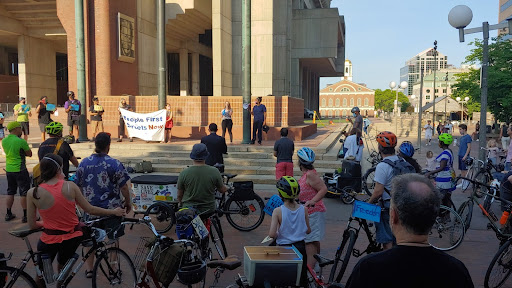Policy Campaigns
The BCU advocates for policies that make streets safer and get more people on bikes. We also support policies that promote sustainability, equity and public transportation. The BCU is a member of the Massachusetts Vision Zero Coalition, the Transportation for Massachusetts coalition, and works with other bike, transit and pedestrian advocates on shared goals.
Vision Zero
As member of the Massachusetts Vision Zero Coalition, the BCU and its partners work to reduce and eventually end traffic fatalities and serious injuries. This includes lobbbying lawmakers at the State House and City Hall, rallying residents to speak up for safer streets, and organizing events (ie. World Day of Remembrance) to bring about change. Among other victories, in 2019 this advocacy led Massachusetts to pass our top legislative priority: A "hands-free" law to curtail distracted driving.

Safe Streets for All: Policing reform
We believe, and have been advocating for police enforcement to be removed from Vision Zero in Boston and nationally. If streets are engineered for safety, and people know how to use that infrastructure, there is no need for enforcement. Traffic enforcement is the #1 way that people in the US interact with police and repeated studies show that Black, Indigenous and People of Color are disproportionately stopped, searched, fined, arrested and physically harmed or killed in these traffic stops. We must focus on engineering, and not enforcement and reimagine any enforcement to focus on discouraging dangerous driving behaviors, through programs like automated enforcement, which we are advocating to pass at the Statehouse.
We are also part of the Defund BosCops coalition, and support moving funding away from the Boston police department to community-led health and wellness programs, youth jobs and job training, affordable housing and more.
Learn more: read our letter to Mayor Walsh about changing police enforcement
Learn more: watch our workshop on Policing + Transportation

Boston Bike Budget
Since 2017, we've campaigned every year for the City of Boston to increase its budget for bike infrastructure so it can build out the bike network at a faster pace. We've made progress every year — including a doubling in bike infrastructure funding in the city's 2020 budget — but even still, Boston is on track to miss its own goals for bike lane mileage as laid out in Go Boston 2030, the city’s transportation plan.

